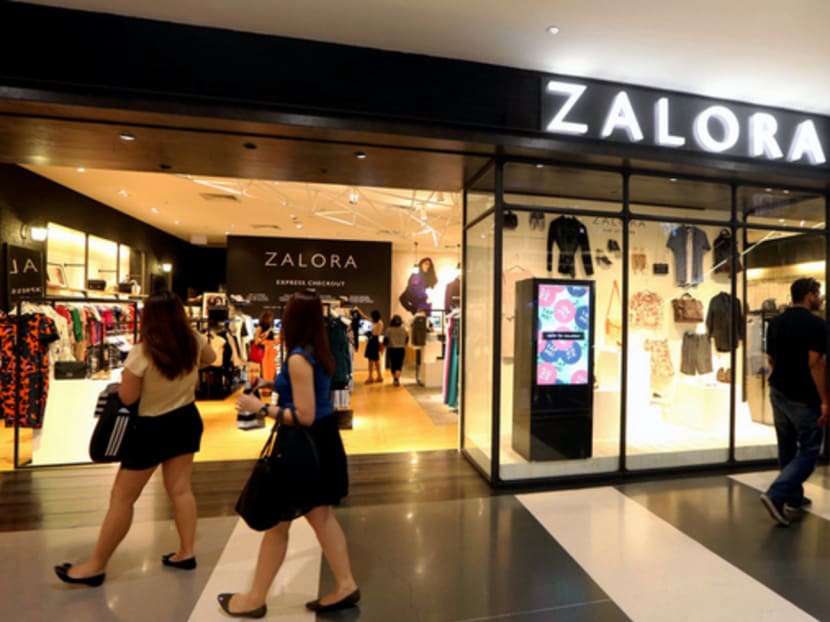Shopping malls revamp amid onslaught from online retailers
SINGAPORE — As the brick-versus-click-sales war intensifies, shopping malls in Singapore are plotting aggressive strategies to stay ahead in the game while they continue to battle falling tourist arrivals, the oversupply of retail space and growing competition for consumers’ attention.

A Zalora pop-up store at Bugis+. Mall operators are adopting innovative space-renting ideas such as pop-up stores to optimise returns from their total lettable space. Photo: Ooi Boon Keong
SINGAPORE — As the brick-versus-click-sales war intensifies, shopping malls in Singapore are plotting aggressive strategies to stay ahead in the game while they continue to battle falling tourist arrivals, the oversupply of retail space and growing competition for consumers’ attention.
Their renewed game plans include reshuffling the tenant mix, exploring more flexible leasing terms with tenants, revamping marketing campaigns and even forming alliances with online sales platforms — all of these aimed at getting consumers to shop more as they spend longer hours at their malls.
“Landlords are adjusting their marketing strategies and tenant mix and repositioning their properties towards offering more entertainment, services and food and beverage (F&B) outlets, aiming to remain relevant in the midst of shoppers taking to online shopping as well as changing consumer preferences,” said DBS Vickers analyst Derek Tan.
Mall operators are making more space for restaurants, cafes and bars as well as entertainment and services-oriented businesses, such as education, beauty and wellness, as these remain insulated from the online onslaught, while department stores and retailers that sell products such as books, toys and fashion continue to be hit by the surge in e-commerce.
Malls now allocate around 35 to 40 per cent of net lettable area to F&B, entertainment and services, compared with about 25 per cent around five years ago, Mr Tan noted.
The increased focus on F&B, entertainment as well as beauty and wellness is also demand-led, as young Singaporeans today are well-travelled and seek more in terms of enhancing their personal appeal and well-being.
“Singaporeans today are more sophisticated and want to explore more when it comes to F&B and beauty and healthcare. This is attracting new F&B players from Japan, South Korea, China, the United States and Europe to enter Singapore in a big way. Several Korean and Japanese cosmetic companies are also coming in,” said Mr Wilson Tan, chief executive of CapitaLand Mall Trust Management. He also emphasised the group’s strategic focus on necessity retail that defends it from disruptions in shopper traffic and volatility in sales revenue.
Besides the onslaught from online retailers offering low-cost shopping and free delivery services, a strong Singapore dollar has prompted Singaporeans to shop abroad as they travel for holidays, making it more challenging for mall owners to attract footfall.
“Over time, the way people shop will change … In the past, we did more conventional advertisements. As we move ahead, we see mobile and digital platforms becoming a lot more prevalent, and that is where we will be looking at, using new technology to bring people into the shopping malls,” Mr Tan said.
Malls are scurrying to identify ways to embrace new sales channels that allow traditional and online retailers to coexist and complement each other. Some are exploring the option of partnering with e-commerce players such as Qoo10.
Mr Hyun Wook Cho, country manager of Qoo10 Singapore, said: “We came up with the Qmall initiative to simplify the process and make it less taxing for offline retailers seeking to take their operations online in a short time. We are in the midst of talking to mall operators to list their tenants’ offerings on Qoo10 and execute novel online-to-offline ideas, like picking up purchases at the store, to drive traffic there for a better brand experience.”
As the e-commerce landscape develops, Mr Cho added, traditional brick-and-mortar brands will find it increasingly important to embrace a multichannel retail strategy.
Meanwhile, mall operators are offering more flexible leasing terms to tenants reeling from thinning margins. Frasers Centrepoint Trust, analysts noted, has adopted a lower base rent plus higher variable component for some of its leases at Bedok Point, to help tenants cope with competition from Bedok Mall.
Mall operators are also adopting innovative space-renting ideas such as pop-up stores to optimise returns from their total lettable space. Pop-up stores are typically short-term leases at malls and other commercial places that allow brands, retailers and budding entrepreneurs to test-market their products, services and campaigns.
Such temporary leases attract diverse tenant types and have the potential to add fresh concepts to the tenant mix, thereby enabling mall operators to differentiate themselves from competitors. CapitaLand Mall Trust, for instance, has set aside 10 to 15 per cent of its lettable space at Jcube for pop-up stores or shorter-term leases of between three and six months.
“Currently, mall owners in Singapore are looking at anywhere between 7 and 10 per cent of their retail space to be allocated for pop-ups or temporary leases for creating various short-term rental opportunities for brands, concepts and ideas, thus promoting and supporting local businesses and creating jobs. Pop-ups also provide an efficient way for mall owners to monetise transient spaces and maximise rentals in between tenancies,” said Mr Pushpendra Sharma, founder, SpacesGenie.com — a Singapore-based online platform for listing and booking such temporary spaces.
Mall operators are also increasingly targeting big events to draw in crowds.
VivoCity, for instance, recently hosted the SAF50@Vivo event, where families were allowed to board the navy’s largest ship, which was berthed at the mall’s waterfront area.
“Capitalising on our wide expanse of space as the largest mall in Singapore, we organise large-scale events to create distinctive experiences for our shoppers … Over the past few years, VivoCity welcomed many first-to-market retailers and F&B operators, we have also continuously refreshed various mall zones to keep the shopping experience new and interesting for our shoppers,” said Ms Joanna Lee, head of retail management at Mapletree Commercial Property Management, which runs VivoCity.





